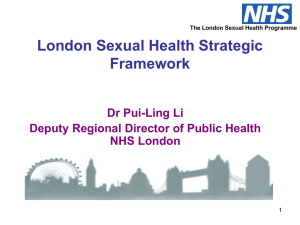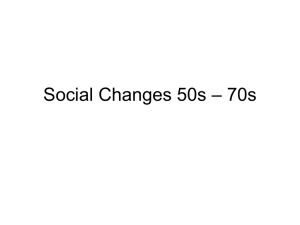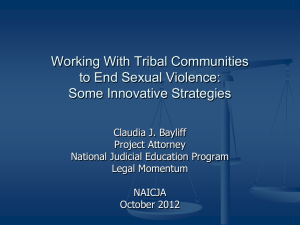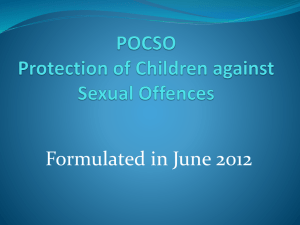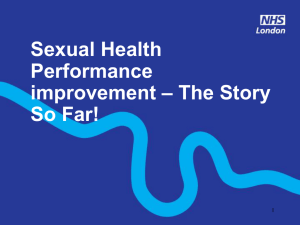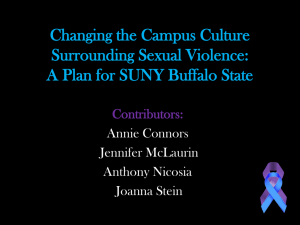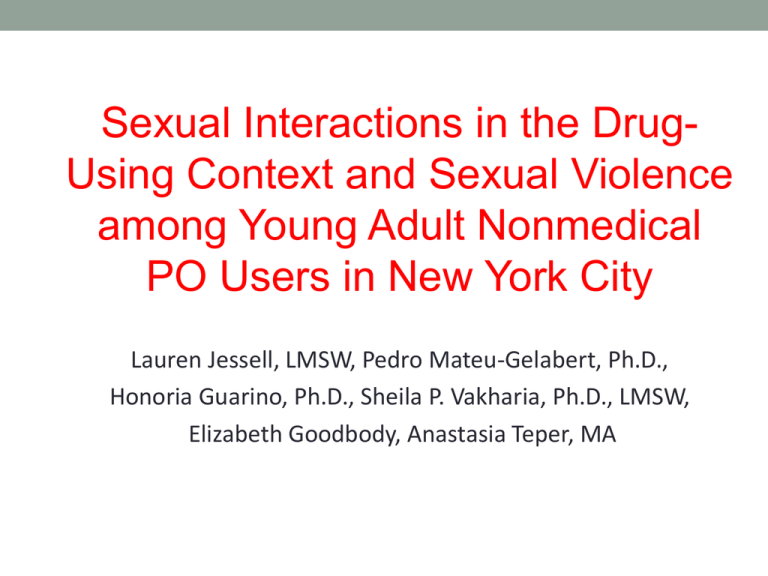
Sexual Interactions in the DrugUsing Context and Sexual Violence
among Young Adult Nonmedical
PO Users in New York City
Lauren Jessell, LMSW, Pedro Mateu-Gelabert, Ph.D.,
Honoria Guarino, Ph.D., Sheila P. Vakharia, Ph.D., LMSW,
Elizabeth Goodbody, Anastasia Teper, MA
Lauren Jessell, LMSW
jessell@ndri.org
National Development & Research Institute
71 West 23rd Street
New York, NY
- This qualitative study explored the experiences of non-
medical PO using young adults.
- It informed a 5-year, NIDA-funded study aiming to
interview & test for HIV/HCV/STIs 600 PO using young
adults in New York City.
- One in five females are raped during their lifetime.1
- Nonmedical prescription opioid (PO) use in the U.S.
has increased significantly in recent years and is
particularly high among young adults.2
- Drug and alcohol use, including nonmedical PO use,
may place users at heightened risk for sexual violence
& create opportunities for perpetration.3
- There is an absence of research on sexual violence
and PO use specifically.
1.
2.
3.
CDC, 2012
SAMHSA, 2013
Mateu-Gelabert, Guarino, Jessell & Teper, 2014; Kilpatrick, Resnick, Ruggiero, Conoscenti, &
McCauley, 2007
METHODS
- Interviews with 46 NYC young adults who reported
nonmedical PO use.
- In-depth, semi-structured interviews (~90 minutes in
length) inquiring about drug and sex risk behavior.
- Analysis informed by grounded theory4 with portions of
interviews related to sexual violence inductively coded
for key themes.
- All names changed to pseudonyms.
4. Glasser & Strauss, 1967
RESULTS
- 46 participants, mean age: 25.3 (range 18-32)
- 27 male, 18 female, 1 transgender
- 32 White/Caucasian, 9 Latino, 3 African
American/Black, & 2 Asian/Pacific Islander
- 14 attended some high school, 9 had a GED/high
school diploma, 14 attended some college, & 9 were
college graduates or had some post-graduate
education
The PO Using Context & Sexual Violence
-Participants described the PO using context & the
sexual interactions within this context as risky for
involvement in sexual violence.
-Themes identified within the PO using context:
implicit and explicit exchanges of sex for drugs
and/or money, negative sexual characteristics
ascribed to PO users by society and peers,
internalized stigma, & fear of the police.
Drug Exchanges & Implicit Quid Pro Quo
Expectations
-Some participants described a quid pro quo
expectation surrounding sex and drug exchanges.
I think that there is an expectation that if a man
gets a woman high, she’s supposed to sleep with
him or give him pleasure, and…Yes, that’s
definitely happened and honestly, I have had sex, I
think, with a couple people that I didn’t really want
to just to shut them up. (Karen, 30, White, Female)
Drug Exchanges & Explicit
Expectations
- Some participants engaged in overt exchanges of
sex for drugs and/or money
I had this one girl, Jennie, call me, you know what
I mean? She’s like, “You know, I’m really sick. I’m
really sick and I have no money… She said, “I’ll
sleep with you,” you know what I mean? Yeah,
yeah, I did. I slept with her.” (John, 21, White,
Male)
Negative Sexual Characteristics Ascribed to PO
Users By Society and Peers
- Participants described being viewed as unworthy of
sexual respect.
There’s guys that will know that these girls have
blacked out and have no idea what they’re doing. And
they’re like, “I’m gonna hook up with her anyway”—
and they end up having sex with them and I just think
it’s disgusting like [imitating a male’s voice], ‘Yo, I’m
gonna get it. Anyone high tonight? Like yo, this girl’s a
fucking dumb bitch. Like she’s a whore, like she
doesn’t know what she’s doing’” (Mary, 18, White,
Female)
PO Users & Internalized Stigma
- Participants also described themselves in
negative terms, revealing the internalized stigma
they held regarding their status as drug users.
I felt guilty. I felt really guilty. I mean, I don’t like
being a manipulative, disgusting drug addict. I just
am one. (Karen, 30, White, Female)
Fear and Mistrust of the Police
- Participants explained that they did not trust that
the police would help and cited past negative
experiences with them.
- Sexual violence remained largely unreported
among participants .
I was scared of cops…I never trusted cops. I was
always afraid of them. (Heather, 26, White, Female)
DISCUSSION
-Recommendations include prevention efforts that
address the PO using context.
-Facilitating safer environments for PO users to report
sexual violence to the police.
-Education for and by service providers that reduces
victim-blaming and acknowledges the variety of
contexts in which sexual violence occurs.
-Efforts to effect a normative change among PO users
and their peers.
CONCLUSION
- Limitations: results may not be generalizable to
all PO users
- Our research outlines the importance of
addressing PO using context in prevention efforts
aimed to reduce sexual violence among PO users
and their peers.
"This study is supported by Grant No. R01DA035146
from the National
Institute on Drug Abuse. Points of view, opinions, and
conclusions in
this presentation do not necessarily represent the
official position
of the U.S. Government, or National Development and
Research
Institutes.“
QUESTIONS?
jessell@ndri.org




